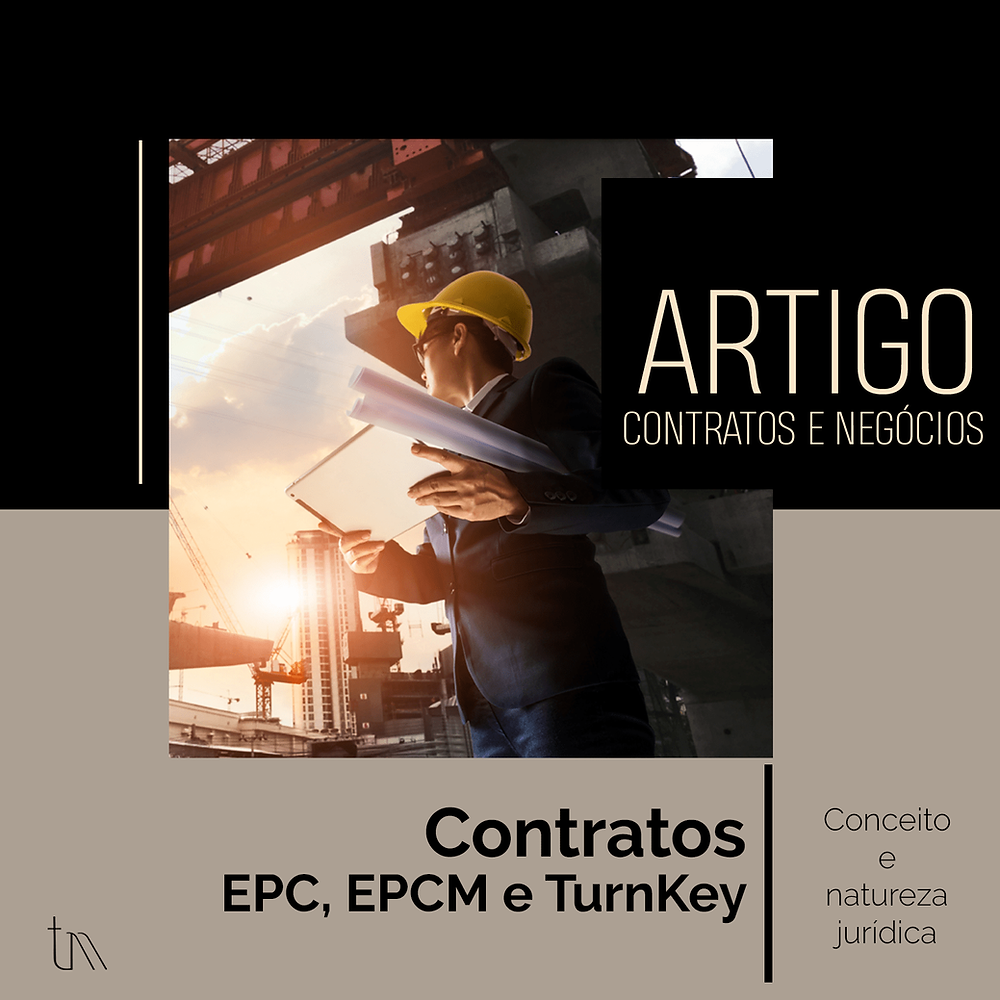Do you know what EPC and EPCM – TURNKEY contracts are?
Contractual style of’ contractor ‘ establishes a larger set of obligations of the contractor
Since the celebration of the World Cup in Brazil in 2014 and until the present day, especially in the Government of Jair Bolsonaro with the increase in concessions for public services, oil and gas energy, EPC contracts have gained prominence as a priority of celebration because of the greater transparency and security in their execution.
How is the construction of airports, construction of solar parks, stadium renovations and large enterprises in Brazil? If you have thought about building contracts you are not totally wrong!
In Brazil, the classic figures of construction contracts have always been adopted, namely, the contract and construction by administration or at cost price. The contract is foreseen in the Civil Code and the construction by administration is foreseen in law n. 4.591 of December 16, 1964.
However, due to the growing infrastructure needs in Brazil, contracting parties began to use strange construction contract models that proved effective in other countries, such as the Engineering Procurement and Construction (“EPC contract”) which brings together various elements such as construction, commissioning, purchase and assembly of equipment, all in one document!
In Portuguese, the acronym EPC stands for engineering, purchasing and construction management. Regarding its concept, the EPC is a contracting modality in which the builder executes the project in its entirety, ensuring the integral execution of the scope, the elaboration of architectural and engineering projects, details and assembly schemes, in addition to all the basic services for the execution of the project: supply of labor, materials and equipment necessary for the realization of the activities.
Therefore, they are characterized by being contracts referring to the execution of large projects, high cost, long term planning and execution, specialized technical team and large number of suppliers.
It is precisely for these reasons that the term EPC is usually used as a synonym for Turn-key, a term already introduced in this article, since it is up to the owner of the work, after receiving the project by the contractor (“Epecista”[1]), only “turn the key” since the enterprise is in immediate operating condition.
Regarding their legal nature, the majority doctrine, such as that of Orlando Gomes[2], classifies “EPC” contracts as an atypical and mixed contract, since they do not fit into any of the contractual species disciplined by the Civil Code, but at the same time, it encompasses several typical contracts, such as that of construction.
On the other hand, Fabio Ulhôa Coelho[3], for example, understands that EPC contracts are equivalent to a large contract, involving from the development of the project to its execution, associated with the contractor’s obligation to obtain financing for the work and provide technical advisory services related to the implementation of the project.
Due to this impasse, it is possible to verify that the construction contracts and EPC have several points in common, however, their points of incongruity are more important than the characteristics that bring them closer.
In this tuning fork, we draw up an intuitive table that reveal your main disagreements:
Table 1 adapted table-elaborated by the author Clara Drumond Degrazia Ribeiro, 2018, PUC-RIO.
An interesting aspect illustrated in the table is that contracts under the EPC-Turnkey modality attribute most of the contractual risks to the contractor, or rather, to the “Epecist”. Consequently, this even concretizes the possibility of the “Epecista” to include in its proposal of services prices and extra deadlines for “congestion”, due to the imminent risks to the execution of the works.[4]
For experts, the great advantage of using this atypical contract is that everything is concentrated in the hands of only one supplier. Thus, the client only needs to run a single contractor company. Likewise, in case something does not go as planned, only one company should take responsibility before the contractor.
On the other hand, due to the possibility of including extra prices (increasing the cost to the customer), many companies are migrating to contracts called EPCM that indicate, in Portuguese, “engineering, purchase and construction management”.
It is also a Turnkey method. Despite the similar name, in this modality, the stages of development of the project and the materials necessary to carry it out are also present. However, this contract does not carry out construction, but construction management.
In other words, in the EPCM contracting modality, it is an activity that basically consists of Project Management. And from the development of the project, the client will hire the others responsible for the work.
In this case, the client continues to have to make all the contracts, but who supervises the works and manages them is the company contracted by the EPCM model.
As an example, in 2018, Poyry, an international engineering company, announced the signing of an EPCM contract for a large company in the food sector in Brazil. The scope included detailed engineering services, supplies and the management of the construction and assembly of a plant in the state of Santa Catarina.[5]
Finally, for a greater understanding of the topic, we separate some advantages and disadvantages of the two EPC and EPCM models that can be seen below:
Rafael De Sordi Barbosa Martins
Junior lawyer at TM Advogados and postgraduate at GV Law-Business Law.
Leonardo Da Vinci
Founding partner at TM Advogados and Master in political and Economic Law from Universidade Presbiteriana Mackenzie.
[1] Pecist: the contractor, the ” contractor”
[2] GOMES, Orlando. Work cited, P.468. In the same sense Leonardo Dias da Silva Telles, engineering contract. LTr, São Paulo, 2010, P.105.
[3] COELHO, Fábio Ulhoa. Course of Civil Law, v. 3. Saraiva, São Paulo, 2017, p. 46.
[4] for a better understanding of the topic, it is recommended: MARCONDES, Fernando. Themes of Construction Law: construction contracts, 2015.
[5] available at: https://www.poyry.com.br/not%C3%ADcias/poyry-anuncia-contrato-epcm-para-industria-de-alimentos-no-brasil







Leave a Reply
Want to join the discussion?Feel free to contribute!